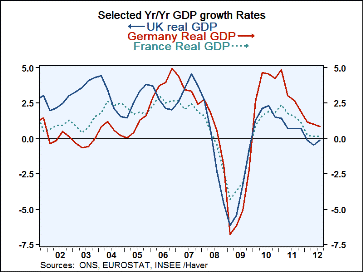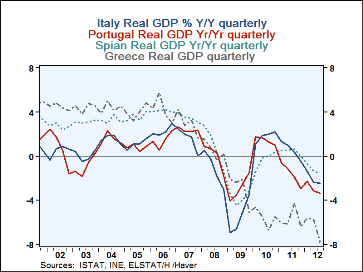 Global| Nov 15 2012
Global| Nov 15 2012EMU and Other GDPs Decline
Summary
Despite some sporadic increases in quarterly GDP growth for the various EU and EMU member in the table, what marks this data set most consistently is that over most of the recent quarters all of the counties are experiencing [...]
 Despite some sporadic increases in quarterly GDP growth for the various EU and EMU member in the table, what marks this data set most consistently is that over most of the recent quarters all of the counties are experiencing persistent decelerations in Year-over-year rates of GDP growth. I guess EMU is somewhat unified after all.
Despite some sporadic increases in quarterly GDP growth for the various EU and EMU member in the table, what marks this data set most consistently is that over most of the recent quarters all of the counties are experiencing persistent decelerations in Year-over-year rates of GDP growth. I guess EMU is somewhat unified after all.
Despite widespread deceleration, not all year-over-year GDP rates are negative but for many countries that is still the case. EMU has two consecutive drops in GDP growth measured year-over-year. Italy, The Netherlands, Portugal, Greece and Spain each have at least four in a row (Spain has no increase in four quarters). Belgium has two declines; the UK has three; so far Germany and France have resisted those trends.
During these last four quarters the US has had what has been consistently the strongest GDP growth of any of the countries in this table.
The graph at the top shows that the growth rates in the large EU/EMU nations are declining. The graph below shows that the weakest economies with the largest slump in their respective GDP growth rates also are experiencing ongoing declines in quarterly GDP that for the most part are still getting worse.
 The European approach to policy has been quite different than the US approach. Led by the Fed, and with politics hamstrung, the US has run a very stimulative and supportive monetary policy leaning heavily on special programs such as QE, Operation Twist and communications strategies including the ZIRP 'guarantee'.
The European approach to policy has been quite different than the US approach. Led by the Fed, and with politics hamstrung, the US has run a very stimulative and supportive monetary policy leaning heavily on special programs such as QE, Operation Twist and communications strategies including the ZIRP 'guarantee'.
The Fed's rationale has been that with such a large GDP gap, inflation is not a problem and policy can be supportive of growth. Like Europe the US has continued to show huge deficits in its fiscal accounts but US policy has tried to focus on the use of growth to stimulate revenues while the political machinery in the US has been just as stultified as it has been in Europe over making the hard choices.
Still, in Europe, at the country level, there has been an emphasis on setting and hitting fiscal targets even in this recessionary period. Germany is the only economy whose real GDP is at 100% of its cycle peak value. For EMU GDP is 2.4% below its cycle peak; exclude Germany from the EMU calculation and EMU is 4.1% short of its peak. Greece is some 20% below its cycle peak for GDP, Portugal is 7.1% below its peak. Italy is 6.9% below its peak. France is close behind Germany with French GDP at 99.3% of its peak real GDP level.
These short falls from peak GDP imply that these countries are trying to scale up their revenues or pare back their spending for an economic structure that should be much bigger. The notion of trying to shrink government spending to meet the revenue of a below par economy does not seem very sensible to me. Classically we expect economies to run surpluses in expansions and deficits in downturns not to reduce deficits in downturns but this is the new austerity way of things in Europe.
Remember that the ratio of GDP to its past cycle peak is not a GDP gap measure; potential GDP grows so where the gap is also depends on how far the current GDP observation is from the peak. In the case of Greece it's a very long time.
However, there is another effect to worry about there. That is that the recession may have reduced the economy's potential. Moreover, some of these economies may actually have been operating on the other side of 'the gap' running excessive growth in GDP relative to its potential. Greece and Spain are probably examples as Greece was profligate in the size and remuneration of its government sector. In Spain activity was pumped up by a property sector on steroids. The Spanish property market has collapsed and many of the buildings are left in a state of semi-completion. Spain's GDP may not see that peak for some time.
So admittedly looking at where EMU member nations are relative to past peaks is not a gospel standard for resizing government and the deficit. But the point stands that while potential GDP may have been taken down few pegs here and there, for structural reasons, has it been decimated by 20% in Greece or by seven percentage points in Portugal or nearly six percentage points in Spain? To which size should these countries be trying to scale their government sector? That's a better question than setting self-defeating and credibility-consuming fake fiscal targets.
But Europe unlike the US is not trying to get growth in gear. It really isn't! Countries bemoan the lack of growth but growth is not the target; the fiscal goal is the target. The basic European plan is to get government in sync with the size of GDP. But if GDP is substantially below where it should be (and is still shrinking!) why should that be an objective for government's size as measured by the deficit? Even the casual observer of Europe can see that these austerity programs have themselves knocked growth down and in the end they have been the very reason that countries have failed to meet their goals. Europe has set a perverse policy program in gear. Nations must pledge to hit certain budget targets. To do it they implement programs of austerity that reduce GDP and in doing so reduce government revenue and make it less likely that they reach these targets. Having failed to reach the targets the countries are set upon for more austerity. This not a joke it is the way policy is operating in Europe.
It is no surprise then that the US, as poor as its growth has been, is a much better performing economy than what you find in Europe. The US still has a fiscal fix to deal with and the political wheels, rusty as they are, are grinding away at some sort of a solution there. I do not pretend that the US political process has worked any better than has the European one. But the US has not hog-tied its economy in the meantime to hit shrinking goals the way Europe has. Despite all its pain, it is hard to argue that Europe has made any more progress in meeting its needs than has the US
Will Europe come to its senses on this before European dissent and demonstrations make it clear that its 'less is even less' approach to economics is not working and will not work? And if it comes to that realization what will it do? How will it fix what's broken in the Zone and will it be able to keep the Zone together while making the necessary repairs? How will it bridge the gap between the poor that have needs and the rich that have the money?
Today's GDP reports raise all those issues. And more.
| E-Zone and Select G-10 Country GDP Results | |||||||
|---|---|---|---|---|---|---|---|
| Quarter/Quarter, SAAR | Year/Year | ||||||
| GDP | Q3-12 | Q2-12 | Q1-12 | Q3-12 | Q2-12 | Q1-12 | Q4-11 |
| EMU | -0.2% | -0.7% | 0.0% | -0.6% | -0.4% | 0.0% | 0.6% |
| Belgium | 0.0% | -2.1% | 1.0% | -0.3% | -0.3% | 0.4% | 0.9% |
| France | 0.9% | -0.2% | -0.1% | 0.1% | 0.1% | 0.2% | 1.1% |
| Germany | 0.9% | 1.1% | 2.0% | 0.9% | 1.0% | 1.2% | 1.9% |
| Greece | -7.6% | -5.8% | -2.4% | -7.8% | -5.8% | -5.6% | -6.4% |
| Italy | -0.7% | -2.9% | -3.1% | -2.4% | -2.4% | -1.4% | -0.5% |
| The Netherlands | -4.1% | 0.5% | 0.5% | -1.4% | -0.6% | -0.8% | -0.4% |
| Portugal | -3.2% | -4.3% | -0.4% | -3.4% | -3.2% | -2.3% | -2.9% |
| Spain | -1.1% | -1.7 | -1.6% | -1.6% | -1.4% | -0.7% | -0.0% |
| UK | 4.0% | -1.6% | -1.2% | -0.1% | -0.5% | -0.1% | -0.7% |
| US | 2.0% | 1.3% | 2.0% | 2.3% | 2.1% | 2.4% | 2.0% |
| EMU less Germany | -0.7% | -1.4% | -0.9% | -1.2% | -1.0% | -0.5% | 0.1% |
Robert Brusca
AuthorMore in Author Profile »Robert A. Brusca is Chief Economist of Fact and Opinion Economics, a consulting firm he founded in Manhattan. He has been an economist on Wall Street for over 25 years. He has visited central banking and large institutional clients in over 30 countries in his career as an economist. Mr. Brusca was a Divisional Research Chief at the Federal Reserve Bank of NY (Chief of the International Financial markets Division), a Fed Watcher at Irving Trust and Chief Economist at Nikko Securities International. He is widely quoted and appears in various media. Mr. Brusca holds an MA and Ph.D. in economics from Michigan State University and a BA in Economics from the University of Michigan. His research pursues his strong interests in non aligned policy economics as well as international economics. FAO Economics’ research targets investors to assist them in making better investment decisions in stocks, bonds and in a variety of international assets. The company does not manage money and has no conflicts in giving economic advice.
More Economy in Brief
 Global| Feb 05 2026
Global| Feb 05 2026Charts of the Week: Balanced Policy, Resilient Data and AI Narratives
by:Andrew Cates






